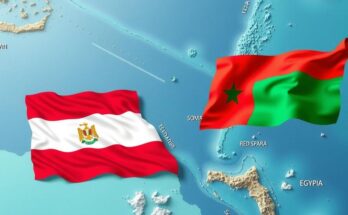A Greek official has criticized the European Commission for failing to implement a common deportation policy regarding migrants, emphasizing that wars and climate change are increasing displacement globally. The EU migration pact, set to come into effect in 2026, lacks key components for effective returns. Greece, a significant entry point for migrants, has experienced ongoing challenges due to unsafe crossings. Meanwhile, other European nations are adjusting their migration policies in response to these developments amid rising international tensions.
A Greek official has criticized the outgoing European Commission for its inability to establish a cohesive approach to migrant deportation, highlighting the exacerbating factors of war and climate change that contribute to global displacement. During a conference near Athens, Sofia Voultepsi, Greece’s Deputy Minister for Migration, expressed concerns regarding the recent European Union migration pact, stating that despite its agreement, it lacks essential components, specifically concerning migrant returns. “We got the (agreement), but the basic piece is still missing: Returns,” she remarked, underscoring the necessity for a unified system for asylum, returns, and integration. Voultepsi noted that ongoing conflicts in the Middle East and Africa, coupled with the adverse effects of climate change, are likely to perpetuate an overwhelming influx of migrants into Europe. She expressed particular concern over the situation in Lebanon amid Israeli airstrikes targeting Hezbollah, which she believes has escalated the refugee crisis. Greece remains a significant entry point for migrants seeking refuge in the European Union, with many arriving via perilous maritime routes from Turkey and Libya. Recently, Greek coast guards rescued 81 individuals from a stranded vessel en route from Turkey to Italy, a stark reminder of the dangerous conditions faced by migrants. In a subsequent development in Europe, an Italian naval ship is set to dock in Albania with a group of migrants intercepted in international waters, illustrating the shifting dynamics regarding asylum applications, which will now be processed in Albania instead of Italy under a newly established agreement. Additionally, Prime Minister Donald Tusk of Poland has proposed to suspend the right to asylum temporarily, a policy that awaits parliamentary approval. The aforementioned events underscore the pressing challenges faced by European nations in formulating effective migration policies amidst increasing global tensions and environmental crises.
The article discusses the ongoing issues of migration within Europe, particularly focusing on the criticisms levied by Greek officials against the European Union’s handling of migrant deportation policies. The backdrop involves a recent migration pact formed by the EU that lacks concrete mechanisms for the returns of migrants. This situation is further complicated by humanitarian crises arising from wars in various regions, as well as the effects of climate change, which are contributing to the displacement of thousands. Greece, serving as a critical entry point for migrants, experiences significant challenges with the inflow of individuals seeking asylum and safety within the EU. The article also touches on other European countries’ responses to the migration crisis, illustrating a broader trend in policy-making concerning migratory flows in light of emerging geopolitical and climatic challenges.
In summary, the criticisms from Greek officials highlight the inefficacies of the European Union’s migration policies, particularly in the realms of deportation and return mechanisms. Current geopolitical tensions and the impacts of climate change are expected to amplify the migration crisis, necessitating a unified and effective response from EU member states. The situation in Greece, as a primary entry point for migrants, reflects wider challenges faced across Europe. The implementation of the EU’s migration pact is crucial as Europe grapples with these pressing humanitarian issues while also witnessing diverging national policies on migration.
Original Source: www.independent.co.uk




